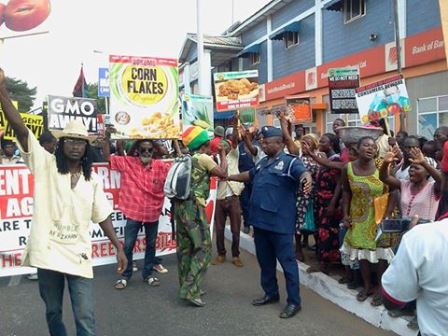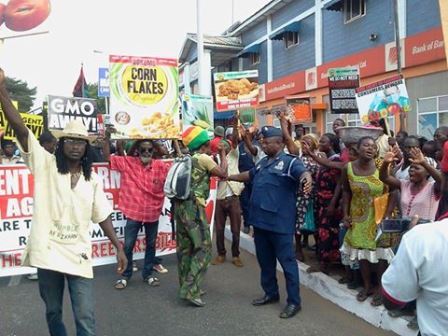 Food Sovereignty Ghana
Food Sovereignty Ghana
May 16, 2016
This year’s international March Against Monsanto falls on Saturday, 21st March, 2016.
Food Sovereignty Ghana and March Against Monsanto – Accra, have the pleasure to invite you to a silent march through some of the principal streets of Accra to highlight our desire for public awareness and participation in decisions regarding biotechnology in agriculture.
We believe that such decisions must not be left in the hands of multi-national corporations and their diplomatic enablers using their GMOs, pesticides, herbicides, and seed monopoly lobby to influence the outcome of government policy.
We shall be assembling in front of TV3 at 7.30 am.
The march is a silent one in respect of the custom and tradition of the Ga State by honouring the ban on drumming and noise making, which is a significant rite observed to usher in the the celebration of the Homowo Festival of the Ga-Dangme.
We shall therefore be marching in silence with placards and banners only.
The route of the march, as notified to the police, remains marching begins from TV3 at 7.30am, then progressing through the main road in front of the GBC, along the Ring Road to link up with Kanda High Street, then through to make a left in front of the new SSB Head office and up the hill through Kokomlelmle, making a right turn to Mallam Atta Market and on to link up with Kanda High Way to end up at the Kawukudi Park, Nima.
March Against Monsanto, is an international grassroots movement against Monsanto corporation, in protest of the company’s practices of using their affluence to influence the outcome of legislations, regulations, research findings, media narratives, etc. The movement was founded by Tami Canal in response to the failure of California Proposition 37, a ballot initiative which would have required labelling food products made from GMOs. Monsanto was reported to have poured in $7,100,500 to help narrowly defeat California’s Proposition 37.
Advocates therefore support mandatory labelling laws for food made from GMOs. We in Ghana however support the call for labelling but since GMOs are yet to be cultivated in Ghana, we go beyond the call for labelling in demanding an indefinite moratorium on or ban on al GM Foods In Ghana!
Since the huge success of the first march, the movement has been growing from strength to strength. Last year saw the march in 48 countries on six continents, from Sweden to Bangladesh, and in over 400 cities involving hundreds of thousands of participants. A larger number of cities and countries are expected this year.
Africa has been under-represented in previous years, but that is changing. According to March Against Monsanto Events, 2016, an unprecedented number of seven African countries are marching: Burkina Faso, Ghana, Kenya, Mauritius, Namibia, South Africa, and Zambia. In South Africa alone, there are marches in nine cities across the country. In all, sixteen African cities are marching on Saturday. This is the third consecutive March Against Monsanto – Accra, since 2014.
Why do we march in Accra?
This year’s march comes at a time where Parliament is reopening with the Plant Breeders’ Bill still compliant to the International Union for the Protection of New Varieties of Plants UPOV, a rather rigid set of intellectual property rights regime that is not suited to our socio-economic conditions. This UPOV-compliant Plant Breeders’ Bill, aka “Monsanto Law”, is on its agenda. What is at stake is the farmer’s right “to save, use, exchange and sell farm-saved seed and other propagating material”.
The bill in Clause 21 (2), puts farmers’ rights at the discretion of the Minister for Agriculture, not rights at all. The same bill in Clause 23, makes the rights of the plant breeder independent of the laws of Ghana.
“Farmers’ Rights” according to the International Treaty on Plant Genetic Resources for Food and Agriculture (ITPGRFA), of which Ghana is a signatory, include the right of farmers to save, use, exchange and sell farm-saved seed and other propagating material; the right to participate in making decisions, at the national level, on matters related to the conservation and sustainable use of plant genetic resources for food and agriculture; the right to equitably participate in sharing benefits arising from the utilization of plant genetic resources for food and agriculture; and the right to the protection of traditional knowledge relevant to plant genetic resources for food and agriculture. It also recognizes “the enormous contribution that the local and indigenous communities and farmers of all regions of the world, particularly those in the centers of origin and crop diversity, have made and will continue to make for the conservation and development of plant genetic resources which constitute the basis of food and agriculture production throughout the world”
Despite several calls for a report on the almost three-year old “consultations” by respective Parliamentary Select-Committee responsible, we are yet to receive any favourable response. The absence of the report makes the entire process as transparent as mud.
The public has an interest to know what petitions were presented and what were in them, and why the Committee in its wisdom is proceeding, in the light of these objections.
It is difficult to see how Parliament is going to proceed with the consideration of the Plant Breeders’ Bill without the publication of such a comprehensive report. This shall be in contravention of the call for “further consultation” by the Speaker, “because it is important to inform the people of Ghana”.
It is a pleasure to be part of what has become the most powerful statement of the ordinary person in the street against the deep pockets of giant lobbies, promoting GMOs, facilitating biopiracy, suppressing farmers’ rights, and other mischiefs.
We are marching to protest the continued imposition of GMOs on Ghanaians by our political class, aided and abetted by scientists blinded often by conflicts of interests and inducements from the GM lobby.
We are marching because, at a time where the monumental failure of Bt cotton in Burkina Faso is an open secret, we would like to see scientists like Dr. Emmanuel Chamba, Plant Breeder and Principal Investigator for Bt Cotton research at the CSIR-Savanna Agric. Research Institute (SARI), Nyankpala, Tamale, recant their justification for their embrace of Bt cotton:
“We realised that Burkina Faso, which is our next door neighbour is growing Bt Cotton commercially and as a result of that they are making a lot of progress in their cotton industry. First of all, the farmers are getting very high yields and as a result they are getting good income out of that and apart from that we also realised that Bt Cotton saves farmers a lot of time and energy and also we thought because with the Bt, it is resistant to the major insect pests in cotton production – the Bollworm complex,”
Meanwhile, if anything at all, the spectacular failure of Bt cotton in Burkina Faso should be a good reason why Ghana must be considering other agroecological solutions rather than the failed technology that impoverishes farmers and enriches the seed corporations.
Burkina Faso abandoned GM Bt cotton in February 2016. The country has begun a complete phase out of the crop, citing the inferior lint quality of GM cultivars. “Burkina Faso’s cotton association is seeking 48.3 billion CFA francs ($83.91 million) in compensation from U.S. seed company Monsanto after it said genetically modified cotton led to a drop in quality, association members said”.
The failure of Bt cotton in Burkina Faso follows the trail of a series of failures wherever Bt cotton has been used in the past. In India, the results were catastrophic as hundreds of thousands of cotton farmers committed suicide following the false promises and investing heavily by borrowing money. It also failed woefully in South Africa, at the Makhathini Flats, which was supposed to be the show case for the rest of Africa.
We are marching because we do not see why anyone in his or her right senses would still be insisting on Bt cotton for Ghana even at this time of the day!
We are marching to highlight the need to learn the appropriate lessons from the international environment under which the march is taking place this year. The recent leaks of the proposed Transatlantic Trade and Investment Partnership (TTIP) have added a new sense of urgency and the importance of the march. We take note that the thrust of the agreements is to enhance corporate power through legal mechanisms. The Panama Papers give us some ideas with what they do with the money they steal from us!
What solutions do we advocate?
As this march takes place at a time the Parliament of Ghana is reopening with the Plant Breeders’ Bill at the top of its agenda, we call on Parliament to completely withdraw the UPOV-compliant Plant Breeders’ Bill and replace it with a “sui generis” plant variety protection (PVP) system suitable to our conditions.
We strongly believe that it is about time that our Parliament shifts the discussion on the controversial and immensely dangerous UPOV-compliant Plant Breeders’ Bill to a focus on a “sui generis” PVP system for Ghana.
We have already pointed out that Ghana is a member of the World Trade Organization and the rights and obligations concerning intellectual property are governed by the WTO Agreement on Trade Related Aspects of Intellectual Property Rights (TRIPS Agreement). According to Article 27.3(b) of the TRIPS Agreement, Ghana has to provide protection of plant varieties by an “effective sui generis” system. Under this, Ghana has full flexibility to develop an effective “sui generis” system for plant variety protection, i.e. to develop a unique system that suits its needs.
There is no need for Ghana to allow our laws dictated to us from an organisation like UPOV in Geneva.
We call for an indefinite moratorium or complete ban on the cultivation of GM crops in Ghana until the science of GM foods and human health, as well as environmental impact, has been thoroughly studied and cleared as safe by independent science rather than corporate-driven, profit-oriented scientists and regulators, ridden with conflicts-of-interest.
We humbly call on the Mahama administration to orientate government policy on agriculture towards what all the experts are saying: agroecology. The technology currently exists that is developing drought-resistant, pest resistant and high yielding crops through traditional breeding and selection. Marker Assisted Agroecological farming is not only inexpensive, and sustainable, it is far more successful than GM technology.
Agroecological techniques are already safely and inexpensively producing crops with increasing yields plus tolerance and resistance to environmental stressors. We should forget GMOs and concentrate on agroecological agriculture. The only reason why our “development partners” are opposed to this is because their multinational corporations shall lose the attempts to monopolize our food through GMO patents. They see our agricultural wealth as raw material to be extracted from Ghana in order to power their economic engine. We need to control and develop our agricultural wealth to power Ghana’s economic engine.
That’s why we invite all to join us as we March Against Monsanto here in Accra.
For Life, the Environment, and Social Justice!
Edwin Kweku Andoh Baffour
Communications Directorate, FSG
Contact: Tel: +233 249867238 / +233 207973808
E-mail : info@foodsovereigntyghana.org
Website: http://foodsovereigntyghana.org/
Twitter: https://twitter.com/FoodSovereignGH
Facebook: https://www.facebook.com/FoodSovereigntyGhana
Saturday, May 21st, 2016.
#MarchAgainstMonsanto – Accra,
Assembling in front of TV3 at 7.30am


